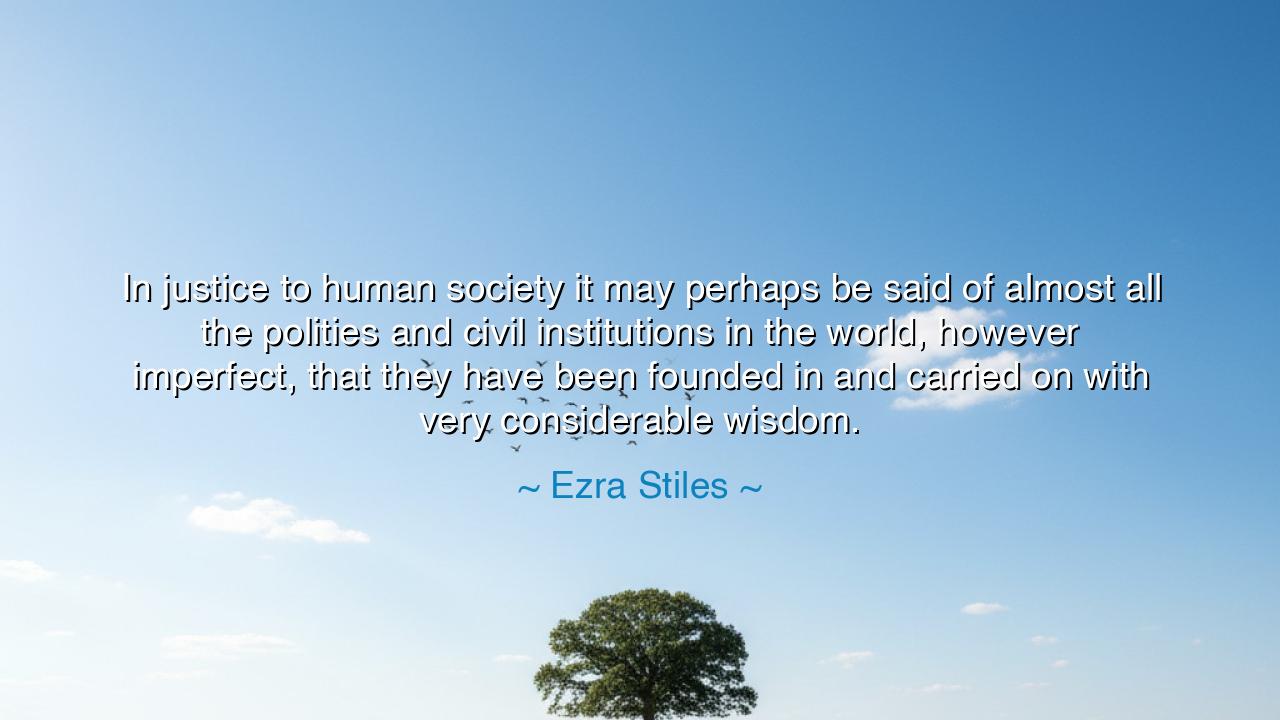
In justice to human society it may perhaps be said of almost all
In justice to human society it may perhaps be said of almost all the polities and civil institutions in the world, however imperfect, that they have been founded in and carried on with very considerable wisdom.






Hearken, children of the ages, to the enlightened words of Ezra Stiles, who proclaimed: “In justice to human society it may perhaps be said of almost all the polities and civil institutions in the world, however imperfect, that they have been founded in and carried on with very considerable wisdom.” In these words lies the eternal truth of human ingenuity, governance, and moral foresight. Though no polity is flawless, the structures of society are rarely born of mere chance; they reflect the accumulated thought, prudence, and foresight of those who sought to harmonize justice, order, and the common good.
Stiles teaches that imperfection does not negate wisdom. Even the most flawed institutions carry within them the marks of deliberation, of lessons learned through trial and reflection. The creation of laws, councils, and social frameworks is an expression of human discernment, an effort to shape society in accordance with reason, equity, and the enduring welfare of the people. Civil institutions are vessels of cultivated insight, guiding human conduct and securing stability amidst the turbulence of life.
Consider the example of the Roman Republic, whose system of checks and balances, though imperfect, endured for centuries. The Senate, assemblies, and magistracies were founded upon the wisdom of predecessors who sought to prevent tyranny, preserve civic virtue, and distribute authority with prudence. Even as corruption and ambition emerged, the underlying structure bore testament to considerable wisdom in its design, reflecting Stiles’ observation that human governance strives for order and justice despite human fallibility.
The ancients themselves understood that society is built upon deliberation and accumulated insight. Greek city-states, Indian republics, and early Chinese dynasties all sought to harmonize law, morality, and civic duty, recognizing that governance is both art and responsibility. Stiles’ reflection echoes this timeless truth: even imperfect institutions are founded in reasoned thought, and their endurance demonstrates the prudence of those who labored to secure order and justice.
Thus, his counsel is both recognition and exhortation: honor the wisdom embedded in the structures that guide human life, even when they falter, and seek to learn from their successes and their flaws. To dismiss civil institutions as wholly arbitrary or corrupt is to ignore the considerable wisdom that underpins them and the vision of those who endeavored to balance liberty, law, and human welfare.
Carry this teaching, children of generations yet unborn: approach all polities and civil institutions with discernment, gratitude, and respect. Wisdom may reside within imperfection, and by understanding its presence, humanity may refine, preserve, and advance the noble work of governance for the enduring benefit of society and the generations yet to rise.






TTMinh Tran Thi
As a reader, I find this reflection unexpectedly compassionate toward humanity’s attempts at order. It acknowledges imperfection while defending the underlying rationality behind social systems. But I’m left questioning whether this optimism overlooks corruption and inequality. Is wisdom still wisdom if it benefits only a few? Perhaps Stiles wanted to remind us that progress is cumulative—that even our failures contribute to the eventual refinement of human governance.
HNho thi hong nhung
This line intrigues me because it recognizes the complexity of civilization. It seems to argue that wisdom is present even in flawed human constructs. But I wonder—how do we measure that wisdom? Is it in survival, in moral vision, or in the ability to adapt? Many societies were built on exploitation yet sustained by brilliant organization. Maybe Stiles is suggesting that wisdom can coexist with moral blindness, which feels both true and unsettling.
TTNguyen Toan Thang
I appreciate the balance in this quote—it neither glorifies nor dismisses human institutions. It feels like a call for humility when judging history. But I’m curious, does Stiles imply that progress itself is born from imperfection? Perhaps even flawed systems carry the seeds of learning that lead to reform. If so, this view transforms wisdom from a static virtue into a process—a collective effort toward better governance over time.
NLThanh nam Le
This statement makes me reflect on how easily we forget the complexity of history. It’s tempting to condemn past institutions for their moral failings, but maybe Stiles is arguing for context—that wisdom doesn’t mean perfection, only earnest intent and adaptation. Still, I wonder whether such a charitable view risks excusing oppression. Can we appreciate the constructive aspects of old systems without downplaying the suffering they caused?
HTNguyen Thi Hoang Trinh
I find this perspective fascinating because it emphasizes fairness in judging human progress. Stiles seems to remind us that civilizations, despite their failings, are products of human effort and ingenuity. Yet, I question whether ‘considerable wisdom’ can justify the harm caused by unjust systems. Does he mean that these institutions were wise for their time, or that every system contains some enduring logic? It’s a generous lens—but perhaps too forgiving.